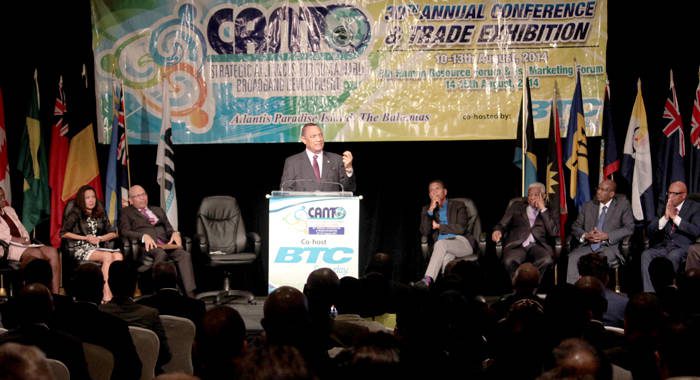NASSAU, Bahamas — Prime Minister of The Bahamas, Perry Christie, has challenged regional telecommunications stakeholders meeting here to dare to use technology to respond to the challenges that the Caribbean faces.
“Dare to dream and tell us policymakers how ICTs can help us all reduce our national debts,” he told the opening ceremony of the 30th annual conference and trade exhibition of CANTO, a non-profit association of operators, organizations, companies and individuals in the information communication technology (ICT) sector.
CANTO has a Caribbean focus as it relates to ICT issues for the region with a global perspective.
“Dare to dream how Caribbean nationals can best benefit from the redefine Maslow Hierarchy of Needs law where generation X sees those needs as food, and shelter and generations Y, Z and Alpha sees Maslow’s needs as untethered, communications, Internet in their pockets and TV everywhere,” Chritie said.
“Dare to dream and provoke policymakers on how we should prepare these small island nations that once depended on the banana and sugar plantations for their survival to evolve to an ICT mecca of assembly lines, data centres, IXPs and become the Caribbean Silicon Valley,” he further said.
“I challenge the members of CANTO this week during your deliberations to dare to dream and tell us how to bring those dreams to reality.
“Dare to dream and provoke us, policymakers, on the way forward to reducing the digital divide in our separate countries and in the region as a whole.”
The prime minister also dared stakeholders to tell policymakers how each national Internet exchange can be connected within the region.
He said that in doing so, the region’s ICT traffic can stay in the region and not have to be exported then reimported.
Keeping ITC traffic in the region, he said, will enhance security and speed and reducing cost.
“Dare to dream about that day in the future when there will no longer be chalkboards in our classrooms rather Smart boards and every child attending school starting at kindergarten will have a tablet and Internet access not just in public libraries and at school but also at home.
“Dare to dream and tell us the policymakers by what means we should achieve the Millennial [Development] Goals of the United Nations by 2015 and prepare for the sustainable development goals beyond that time.”
Christie further urged the conference to help digital immigrants better understand the digital natives in Caribbean societies.
The four-day conference which ends on Wednesday, is being held under the theme “Strategic Alliances for Sustainable Broadband Development”
And Christie noted that CANTO has been inserting “broadband” into its theme for some years now.
“You are established in 33 countries with 120 members on 4 continents. As providers of ICTs, in your hands rest the sustainable growth of the 40 million people of this Caribbean region; their quality of life can be shaped by you,” Chrisite said.
And, Chris Dhering, chairman and chief marketing officer of LIME, said conference participants should consider several issues during their deliberations.
“How are we going to develop and create an environment technologically to unleash the unquestioned talent and creativity of Caribbean people?” he said.
“… the world is moving ahead, the Caribbean needs to keep up, so collectively, we have a responsibility not just telecommunications service providers but also as Caribbean nationals. So, we have a vested interest in doing this, not just for the companies we represent but the people we represent,” Dhering said.
Reginie Fraser, secretary-general of CANTO, outlined the reality regarding broadband in the Caribbean.
“Broadband access is absolutely crucial to our countries development and is instrumental for the nations to remain economically competitive in the 21st century,” she said.
“Testament to this is the fact that broadband serves as the foundation that bolsters a nation’s GDP growth, as it drives innovation, boosts the countries’ start-up economic system, revolutionises the delivery of education, creates employment opportunities and bolsters creativity,” she said.
But Dirk Currie, chair of CANTO board of directors, noted that while CANTO has done much to advance the interest of its members to the benefit of Caribbean nationals, the market has also changed much during CANTO’s 30 years of existence.
“We used to have operators and service providers that were all operating in an operating in an environment where all had a licence to operate. Since the technology is moving forward, we are experiencing a drastic and rapid change, where some service providers don’t have a licence to operate — the so-called over the top players — competing with licenced operators. … The playing field is a totally re-defined one where the rules, from a regulatory perspective, haven’t really changed much in terms of reflecting this new era.”
And Fraser restated CANTO’s commitments to defending the interest of its members.
“We pledge to do our part as we work towards a connected Caribbean. … CANTO will focus its 30th year on creating strategic alliances allow stakeholders to bolster and develop broadband infrastructure in the Caribbean. This will create a more economically viable region for all and in so doing strengthen the social fabric of our Caribbean basin,” she said.
“For the future, CANTO will strive to remain the authoritative fertile ground, acting as a catalyst for fruitful networking with the region’s key industry champions,” she said.
The conference also saw 18-year-old William Malor Junior of Belize being presented his prize for winning CANTO’s video competition with his production “How Broadband Sustains Me”
Over the past three decades, Canto has grown from 8 members to 140 members in 34 countries across four continents.






